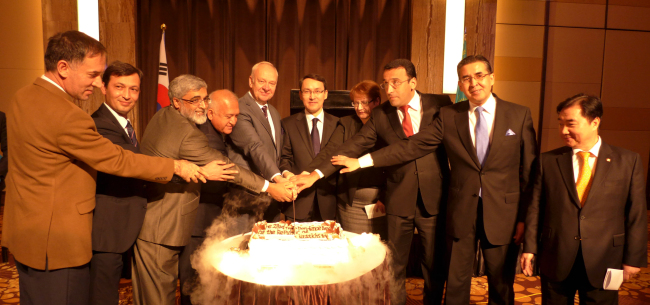Twenty-three years ago on Dec. 16, Kazakhstan became an independent nation after seven decades as an “autonomous republic” in the Soviet Union.
The country now has the largest and strongest economy in Central Asia, and aims to become one of the world’s 30 most competitive economies by 2050.
Diplomats, businessmen, journalists and students from Korea and Kazakhstan joined the evening gala to mark Kazakhstan’s National Day at Millennium Hilton Hotel in Seoul on Thursday.
Kazakh Ambassador Dulat Bakishev made a keynote speech, stressing that “Kazakhstan and Korea made great strides in our bilateral strategic partnerships. Politically, the two countries work closely to promote regional stability and create prosperous societies with human dignity.”
Bakishev said his government had undertaken statewide structural reforms to improve the country’s political stability and economy.
“Korean people appreciate the value and significance of independence better than anyone else,” Korea’s National Assembly deputy speaker Lee Seok-hyun said in a congratulatory speech. “The Kazakh people truly deserve such a celebration as you have steadily advanced your economy, democracy and welfare toward a brighter future.”
 |
Kazakh Ambassador to Korea Dulat Bakishev (fifth from right) and other ambassadors pose for a cake-cutting ceremony at the 23rd anniversary reception of Kazakhstan’s National Day held at Millennium Hilton Hotel in Seoul on Thursday. (Joel Lee / The Korea Herald) |
The ambassador emphasized his country’s efforts to create a business-friendly environment ― characterized by tax breaks and refunds on capital outlay ― which has attracted massive foreign direct investment. According to 2013 data by the U.S. State Department, Kazakhstan has the best investment climate in the region.
Diplomatic relations between Kazakhstan and Korea were established in 1992. There are currently some 100,000 ethnic Koreans living in Kazakhstan, mostly the third and fourth-generations of the diaspora deported to Central Asia through Soviet purges in the 1930s.
Kazakhstan is a key Korean trading partner in Central Asia. President Park Geun-hye visited Kazakhstan in June to facilitate bilateral economic cooperation and cement her diplomatic leverage in the region. On Nov. 29, the two countries began a visa waiver program.
More than 300 Korean firms, including Samsung, Hyundai, LG, POSCO and SK Corporation, have invested more than $2 billion in Kazakhstan, clustered around its crude oil, natural gas and mineral industries.
“Our dream is to make our country a better place to live,” said Samat Nurkalin, 22, a freshman at Ulsan National Institute of Science and Technology who was one of the 15 Kazakh students invited to the event.
Unlike Korean students, who are pressured to rack up their qualifications in an ever-tightening job market, Kazakh students study in the national interest, he said. “We study the sciences, technology and business to develop our fledgling country. The burden of nation-building lies on our shoulders.”
Guldana Sakiyeva, 18, a sophomore at Korea University and president of the Kazakh student said her country invested a lot in scholarships and overseas education programs.
Kazakhs consider themselves “Eurasians” at heart, Sakiyeva said, reflecting the more than 130 nationalities that coexist in Kazakhstan. Kazakhs also speak Russian, which has an equal status in government alongside Kazakh.
Adilkhan Kopabayev, a 19-year-old student at UNIST, said that Kazakhstan’s natural resources and Korea’s technology and capital could be combined for a win-win partnership. He also said that Korea’s rapid developmental experience, backed by Koreans’ strong work ethic, provided a model of progress.
Kazakhstan enjoyed an average of nearly 8 percent economic growth over the last 15 years, supported by rising oil and natural gas output. The government initiated a conservative fiscal policy of reining in expenditures and saving the oil revenues in a national oil fund.
In an unexpected state-of-the-nation address in the capital city of Astana on Nov. 11, Nazarbayev announced his ambitious “Bright Path” national development plan. Targeting massive state investment in transportation and energy infrastructure and construction projects, the plan is designed to respond to the global economic downturn. It also covers areas of finance, manufacturing, housing and education.
Kazakhstan is also looking beyond its landlocked territory to “think big.”
As a bridge connecting Europe and Asia, the country aspires to build a transcontinental transport corridor as part of a China-led “New Silk Road Economic Belt” project. Participating in the project is expected to develop the country’s small towns and infrastructure in remote areas in addition to creating jobs.
The “Kazakhstan 2050 Strategy” aims to bring Kazakhstan into the ranks of the world’s 30 most sustainably developed countries in the next 35 years. The 2017 International Exposition will be held in Astana under the theme of “Future Energy,” focusing on innovative and practical solutions to global energy issues as well as their environmental impacts.
By Joel Lee (
joel@heraldcorp.com)








